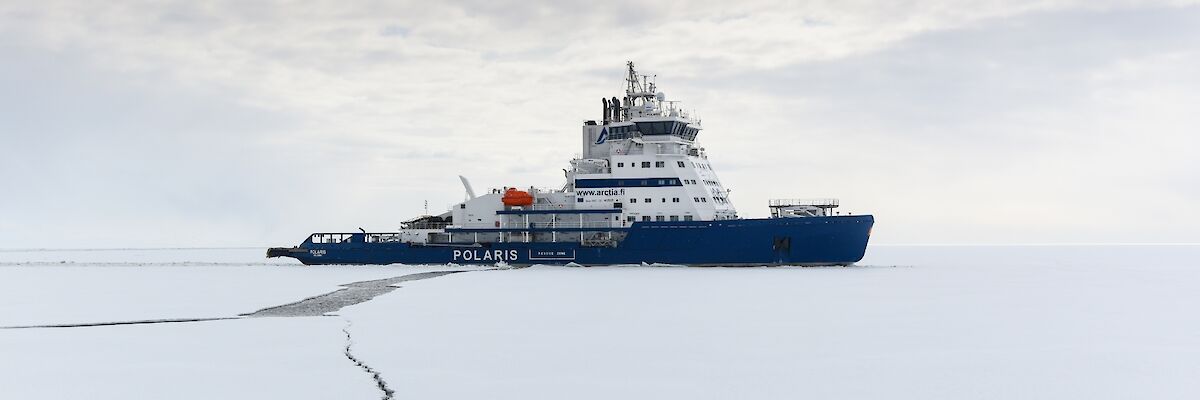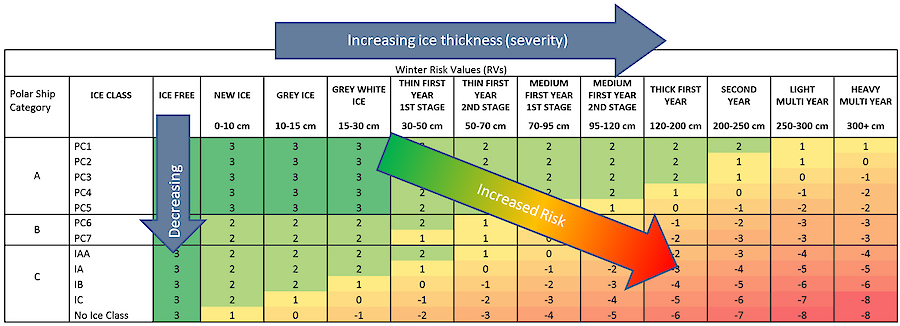
POLARIS
BACKGROUND
Ships operating in polar waters require a Polar Ship Certificate, including identification of the ice regime methodology used for operational limitations, issued by its flag administration or its authorized representatives, attesting that the ship complies with the ship safety requirements in Part I-A of the Polar Code. The IMO issued IMO Circular.MSC.1/Circ.1519 which contains POLARIS, a key methodology for assessing ice operational risk and is an integral tool of the IMO Polar Code to strengthen safety of navigation, and protection of the environment.
This methodology ensures that the vessel is capable of navigating in the ice conditions anticipated for each operation.
PROJECT SUMMARY
This project will collect information from ships using the Polar Operational Limitation Assessment Risk Indexing System (POLARIS), a key methodology for assessing ice operational risk and an integral tool of the IMO Polar Code. The POLARIS methodology was agreed at IMO as ‘interim guidance’ providing for a review four years after the entry into force of the Polar Code in 2017, in order to make any necessary amendments based on experience gained. To date no review has taken place, and the aim of this project is to collect data, and evaluate it against the POLARIS methodology in order to inform the formal IMO review process. This will strengthen safety of navigation and protection of the marine environment in the Arctic.
To facilitate the project, information is required to be collected from vessel operators and/or maritime administrations, followed by an evaluation, with a Summary Report prepared with a view to informing an eventual IMO POLARIS Review. The project will seek relevant experts from all PAME Members, as well as industry, to participate in a project correspondence group. This group will oversee the collection and evaluation of data and information and will develop a Summary Report.
With support from the PAME Secretariat, the data will be formulated and stored on a specific section of the PAME website to allow access for researchers and others interested in POLARIS. No data will be shared without authorization from relevant Administrations.
The group will meet regularly and report back to PAME, as well as PAME’s Arctic Shipping Best Practice Information Forum and the IMO, as needed.
This project supports many recommendations from the AMSA Report, which were updated in 2019, strategic actions from the Arctic Marine Strategic Plan, and links to other projects within PAME, such as the Arctic Shipping Best Practice Information Forum.
KEY OBJECTIVES
- To establish a correspondence group with relevant experts, including experts from industry and research institutions, to identify what information is necessary to conduct a review of POLARIS.
- To collect this information from operators with the assistance of Arctic States and Observer State administrations.
- To evaluate the information collected to understand the effectiveness of POLARIS as an operational tool.
- To identify any needs for refinement.
- To complete a Summary Report
WHAT IS POLARIS?
In brief POLARIS uses a Risk Index Outcome (RIO) value to assess limitations for operation in ice. For each geographical area encountered the Risk Index Values (RIV) assigned to the ship, based on the ice class, are used to determine a RIO that forms the basis of the decision to operate or limitation for operation. If the RIO is Zero or Positive the ship can proceed. If the RIO is between -1 and -10 the ship can proceed subject to certain limitations (e.g. speed restrictions). If the RIO is below -10 the ship is subject to additional operational requirements based on ice class.
Risk Values inputs are from IMO MSC.1/Circ.1519, illustrated below:

To date, data collection and formal evaluation of the effectiveness of POLARIS has been limited to isolated university-based studies which have typically focused on single ship experiences / load monitoring. No known coordinated or comprehensive review has taken place. Feedback from ship operations has not been forthcoming. As such the maritime community, including the Arctic States that rely on the Polar Code (and through it, the use of POLARIS) to ensure safety of shipping in their waters and protection of the environment, have limited understanding of the suitability of POLARIS, both as an operational tool and as a component of maritime regulation.
To understand the effectiveness of POLARIS as an operational tool in order to identify any needs for refinement, as envisaged by IMO, and to support developments in safe and efficient Arctic shipping, data must be gathered, evaluated and conclusions fed back to the Arctic States, their maritime administrations, the IMO and the shipping industry.
IMO POLARIS Update: Current Usage and Status
Presentation from James Bond (ABS) - Link
POLARIS has feautured heavily in PAME's Work, including at the Arctic Shipping Best Practice Information Forum, and the IMO Polar Maritime Seminar in 2022.
There, the American Bureau of Shipping’s Director of Polar Research and Ice Class Ships, James Bond, and Rob Hindley from Aker Arctic Technology looked at the status and usage of POLARIS, the Polar Operational Limit Assessment Risk Indexing System. It has multiple uses, for instance, evaluating risk and voyage planning but, Mr. Bond noted, the key to understanding POLARIS properly is training – including extensive knowledge of sea ice. He also observed that the tool was not always being used appropriately.
Rob Hindley concentrated on the role of data to make POLARIS effective – what is the right data, how should it be collected and in what form, and what would happen with it? He also stressed the importance of “groundtruthing” of POLARIS with observations of actual ice conditions in front of the ship.
Contributing from the floor of the Seminar, Lisa Kelley from IAATO said that tourism operators are "hungry" to provide data for POLARIS but she cautioned that if they were to be asked for it by several agencies at once, it could become overwhelming. She echoed earlier comments that had been made calling for a centralisation and standardisation of data collection accessible to a number of organisations.
 Arctic Council Working Group
Arctic Council Working Group